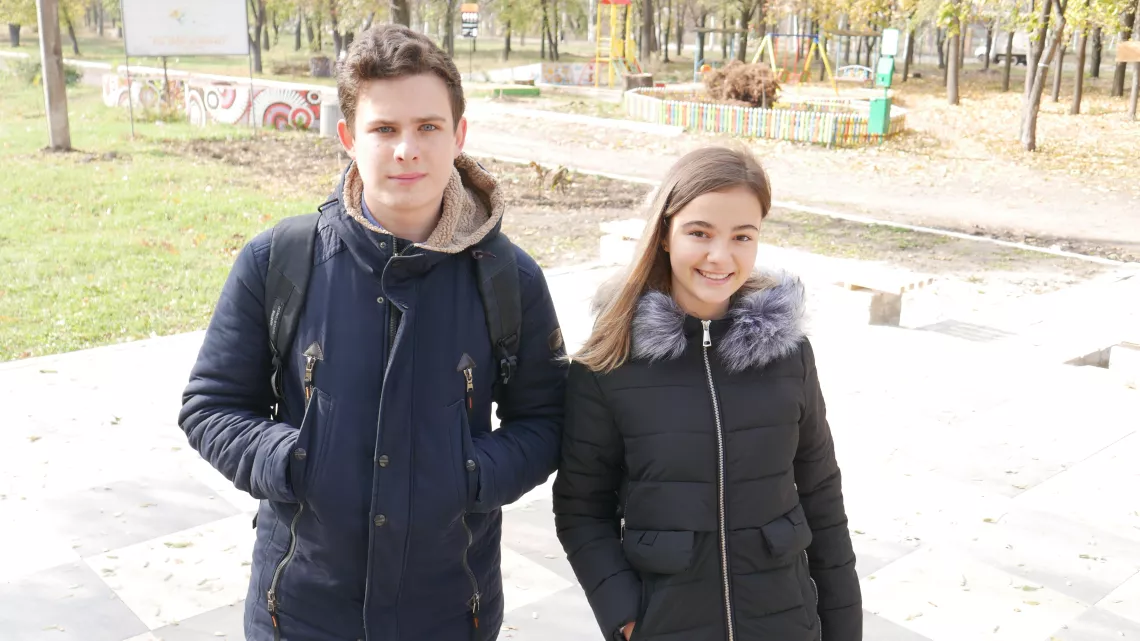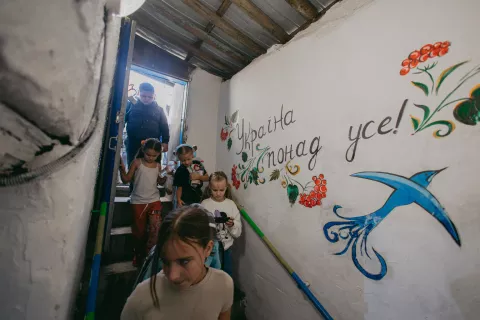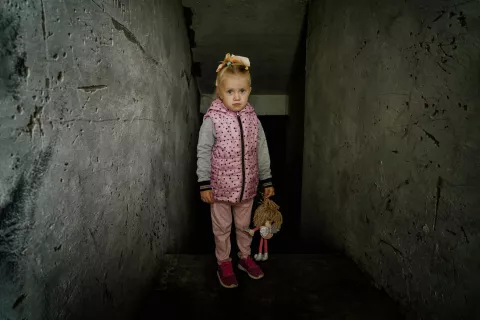Small Grants initiative brings new ideas to life in eastern Ukraine
Children and teenagers have big ideas about their communities. Now they have the means as well

- Available in:
- English
- Français
A new Small Grants initiative is funding projects dreamed up by young people, with an emphasis on including those who have been displaced by the ongoing conflict.
SLOVIANSK, Ukraine, 9 November 2016 – Oleksiy, 14, Karyna, 14, and Tetiana, 28, live in Rodynske, a small town near Pokrovsk in eastern Ukraine’s Donetsk oblast. Although Rodynske is home to 10,000 inhabitants, including 3,500 children and young people, sports facilities are very limited.
“Well, we do have some sports facilities, but you have to pay to play there,” said Oleksiy. “The local government owns them, but still we somehow have to pay. If you want to play football, it’s 20 UAH per person per hour. The gym is 150 UAH per month.”
Oleksiy gets about 300 UAH in pocket money from his parents each month, but he also has to buy food in the school café. “So I don’t have any extra money to spend on sports,” he said.
So when the UNICEF-supported Teplitsya Youth Centre in Sloviansk launched a Small Grants initiative, calling for ideas for projects from young people in eastern Ukraine, Oleksiy and his friends jumped on the opportunity. Teplitsya held trainings on how to develop a proposal, and within a few weeks they received almost 30 submissions from young activists. Among them were Oleksiy, Karyna and Tetiana, who submitted a proposal for a new fitness circuit in their local park.
“All we ask for is about 15,000 UAH. We need the money to buy the materials to build the fitness circuit. We will do a master class on how to work with metal and then we will build it with our own hands,” they said.

Bringing communities together
The organizer of their group was Tetiana, a former journalist who is internally displaced from Donetsk. In many cities in eastern Ukraine, it is the displaced children who bring in new ideas and innovative approaches to youth engagement and civil society in general. They often see this as the best way to get anchored in their host communities and “give something back”, Tetiana said during a visit to Teplitsya where she and her group presented their project idea to the Small Grants Committee.
When the selection process was finished, the Teplitsya Youth Centre decided to support eight projects: four in Sloviansk, two in Lyman and one each in Dobropillia and Rodynske. Tetiana, Oleksiy and Karyna were thrilled – their proposal had been successful.
The committee that decided about the funding was local, said Yana Pomelnykova, Small Grants Coordinator at Teplitsya. “We had two people from our youth centre in the committee, the deputy mayor of Sloviansk and a representative of the regional administration who works on youth and sports issues.”
The local UNICEF contact person from Kramatorsk also joined in and, of course, there were two young people in the committee. “We want the process to be inclusive and take different points of view into account,” said Pomelnykova. “We’re really happy with the eight projects that were selected and that will now get the necessary funding.”
With the expansion of the youth centre network in eastern Ukraine, small grants competitions will soon also be held in Mariupol, Volnovakha, Dobropillia and Kharkiv. The maximum funding per project is US$1,000 and a total of US$250,000 is available for the Small Grants initiative thanks to financial support from the German government through KfW (Kreditanstalt für Wiederaufbau). The NGO Slavic Heart also runs a similar project in Sviatohirsk with support from UNICEF Ukraine, and recently approved five local youth-driven projects.

Offline youth
In the town of Sloviansk, Olexandra, 15, and Danylo, 16, face similar problems as their peers from Rodynske. They represent an initiative called ‘Offline Youth’, which aims to engage their peers in non-computer based activities. Their project idea is to build an outdoor chessboard in a park in the centre of their city, and to have a big event with as many people as possible, young and old.
“This park used to be a main hang-out for drug users, but since some local initiatives have started cleaning it up, built a playground for children and put up some new benches, the place has changed," said Olexandra.
And thanks to the hard work of Offline Youth, the park will become an even more welcoming place for the community to come together. Like their peers in Rodynske, Olexandra and Danylo's proposal was selected.
"Now we are building our chessboard here, also with benches, and we hope many people will enjoy the game and talk to each other,” said Olexandra.
Offline Youth is a youth-run initiative with a core group of 10 young people. “There are many others who help with different projects that we do, but the same group always comes up with the ideas. We also have several [internally displaced people] among us, but we don’t see them as strangers,” Olexandra added. “They live here with us, they want to improve the standard of living and so they are just like us.”



